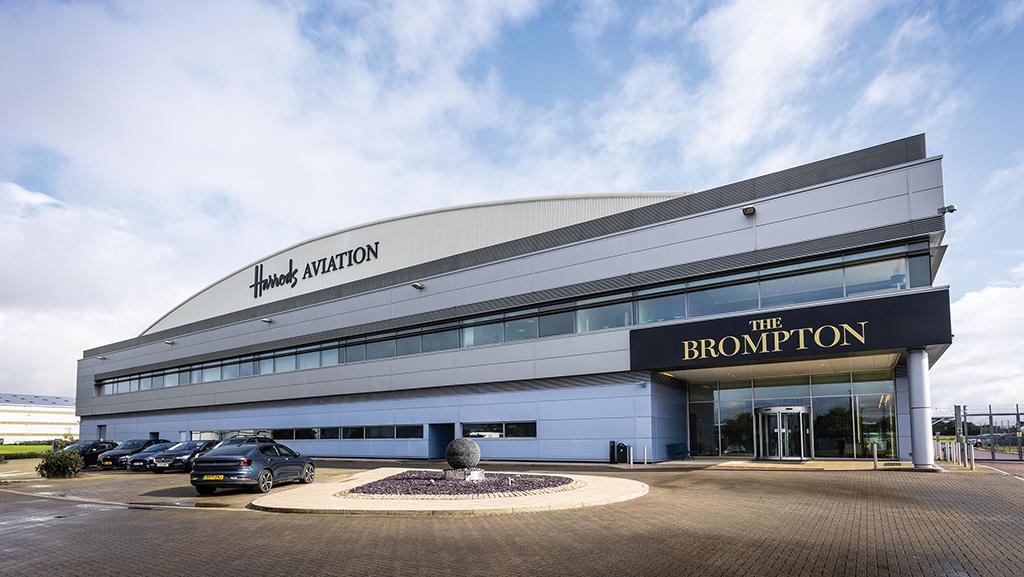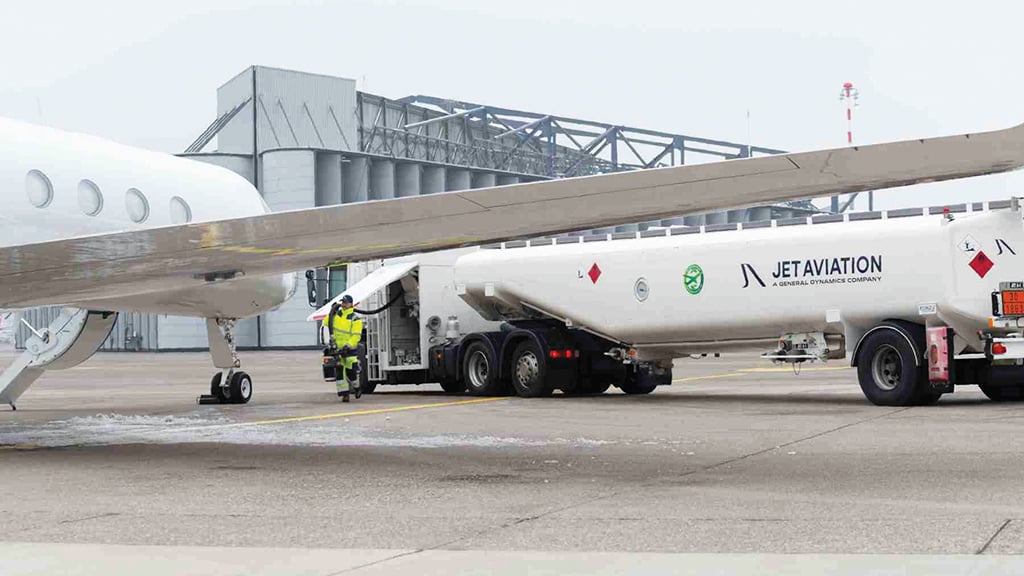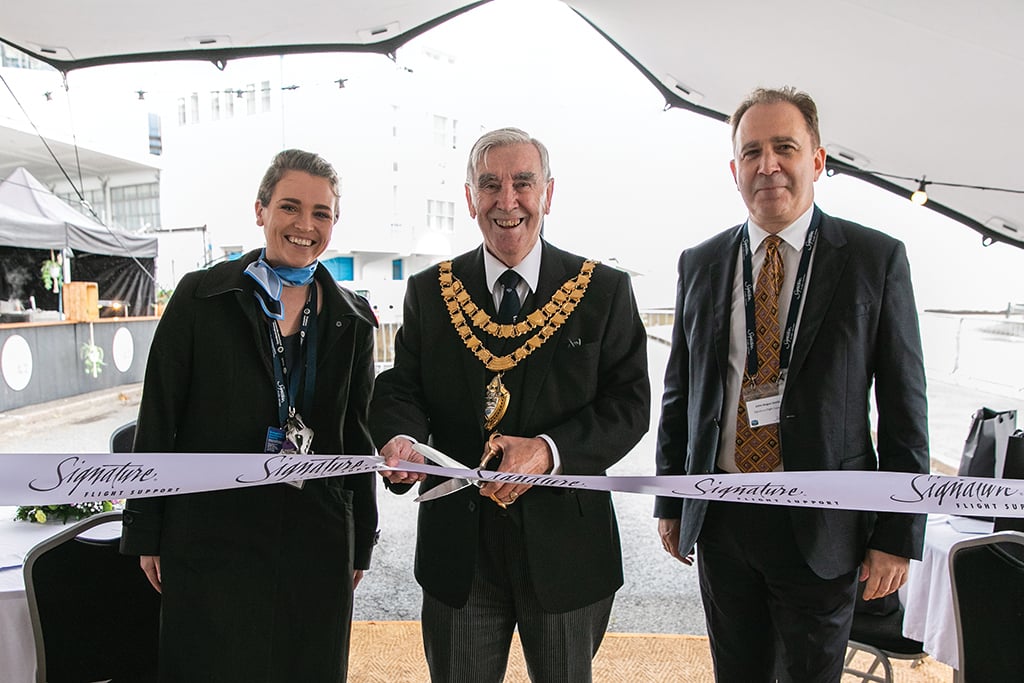
Harrods opened their second FBO at London Stansted Airport in October 2023. The Brompton complements the adjacent facility, now known as the Knightsbridge.
With the aftereffects of the Covid-19 pandemic and its travel restrictions now well in the rearview mirror, Europe’s business aviation sector is getting a clearer idea of what its new operational normality looks like. While there are granular differences on certain routes and individual cities, in broad terms, utilization of private aircraft has settled at a level higher than in 2019, albeit not as high as at certain points in the post-COVID rebound.
Even as clarity emerges over demand signals, though, there are other factors that affect bizav’s ability to plan for the medium and longer terms. For reasons that are widely known, if not necessarily accepted, the sector has found itself being singled out for attention by both environmental activists and governments as pressure builds across society to cut greenhouse gas emissions.
As well as protests at airports, trade shows and industry conferences, bizav is coming under pressure from national and local governments. Amsterdam's Schiphol Airport announced restrictions on business aviation among a raft of proposals to limit flights more generally, only to rescind those plans following pushback from the Dutch government. Spain has joined France in banning domestic flights between cities with high-speed rail links. In the London region, the continent's busiest bizav market, Farnborough Airport is facing unprecedented levels of opposition to its plans to raise its movement cap, while Stansted and Luton airports will be largely closed to out-of-hours business aviation traffic again this summer.
All of this represents a challenging enough planning environment for aircraft owners and operators, but for fixed-base operators (FBO) the complexities are even more pronounced. Capacity and seamless throughput of passengers and cargo can only be guaranteed by investing in expensive and long-term infrastructure, but if the certainty over the ability to operate is affected by political responses to shifting social perception, how can FBO owners make sensible and cost-effective plans?
“We look at the geopolitical environment in every country that we look to operate in as a natural part of our business planning,” says John-Angus Smith, managing director for Europe, Middle East and Asia with Signature Aviation, which operates a network of FBOs at 200 locations in 27 countries. “I get questioned all the time by our global management about the environment over here [in Europe], and how we're planning our business in relation to those risks.”

“It's not just about what we do as a company, it's also about what we should do as an industry,” Smith continues. “The industry adds significant value at country level—at any level. What we've got to do as a business is defend our reputation.”
Smith stresses the role that trade associations, such as the European Business Aviation Association (EBAA) and the British Business and General Aviation Association (BBGA), have to play in advocating for sector companies at a government level. But ultimately, companies like Signature Aviation can only exercise a direct influence over aspects of the business aviation ecosystem that they control. For this reason, in part, he believes that the company's work to decarbonize its own operations is critical.
“It's important for our brand, and the progressive perception of our brand, that we are a leader in minimizing our carbon footprint,” he says. “We're doing that through proactively addressing the three areas of emissions. In terms of Scope 1, we are moving our GSE [ground support equipment] fleet progressively to electrically driven vehicles. We're putting our first electric fuel bowser [at Nice Cote d'Azur Airport] as part of a commitment we made to the airport when we renewed our license there. On the Scope 2 side, we've moved all of our lighting to LED, so we are minimizing our power use. And we're a major supplier of sustainable aviation fuel.”
Sustainable aviation fuel (SAF) is as critical to FBOs meeting their own emissions-reduction targets as it is for aircraft manufacturers and operators. Demand is still limited by the price differential with standard fossil fuel, but supply is currently the bigger problem for Signature.
“We want as much SAF as we can get,” Smith says. “We sold over a million gallons at Luton last year. As a global organization, we sell over 8% of the world’s SAF. We want it everywhere around the network, and this is an area where governments could really help us, by mandating the airports to make SAF available. But the challenge on our side is really encouraging the suppliers to make SAF available to us. They'll have a tendency to prioritize [airlines], which is clearly more commercially beneficial to them.”
This multi-stranded approach is mirrored by other FBO operators. Harrods Aviation expanded its footprint at Stansted Airport in 2023 after acquiring the private facility owned by the late owner of the Harrods brand, Mohammed Al Fayed. The firm's commercial director during that expansion, Will Holroyd, left the company in February 2024, but during an interview conducted before his departure explained that the decision to acquire its third FBO and its second at Stansted was motivated by the increasing demand the company had seen at the hub airport.

“They're both unique, and they both offer something very different,” Holroyd says of the two Stansted FBOs, which the company calls the Knightsbridge and the Brompton. The former has larger lounges as well as separate areas for smaller groups, so lends itself to large-aircraft charter and head-of-state or VVIP flights. The new Brompton location can comfortably handle groups of up to 30 people, but also enables passengers to be driven direct to the aircraft. And with the significant increase in hangar space acquired with the addition of the Brompton, Harrods Aviation is better able to accommodate customers who wish to park aircraft at Stansted for extended periods.
Holroyd acknowledges that wider public perception and regulatory questions are not ones he and his company are able to control, so instead he is concentrating on the parts of the sustainability challenge that Harrods Aviation has the power to directly affect.
“I've got to look at my business,” he says. “We don't operate any aircraft, but we do operate three very large facilities. What can we do in those facilities to make a difference? We're looking at simple things: LED lights, for example, and how we heat the hangar. When we replace a vehicle, we're replacing a fossil-burning vehicle with an electric vehicle. We'd looked at carbon offsets, but we've been educated that perhaps that isn't [the right thing to prioritize]. You should be looking at what changes you can make to actually make yourself more efficient.”
SAF is not yet available to Harrods’ Stansted locations, but the company has been able to implement a book-and-claim system, through a fuel-supplier intermediary, which sees SAF uploaded to aircraft “five miles from where it's actually made,” in California, Holroyd says.
While book-and-claim is working at Signature Aviation’s U.S. locations, the company has not yet found a workable solution for Europe. There are differences across different nations as to how carbon credits from paying for the fuel can be claimed by the purchasing entity—which, at present, are preventing the company from being able to offer this as an option to its customers in Europe, Smith says. He highlights this as an area in which government intervention, and lobbying by the associations, could make a big difference.
Jet Aviation, which operates several FBOs across Europe, including at Amsterdam Schiphol, says it, too, supplies SAF at its locations “where it is available in close proximity.” This includes Amsterdam. The company also supplies SAF during certain events, such as the World Economic Forum and at EBACE in Geneva.

Joao Martins, Jet Aviation’s vice president for regional FBO operations in Europe and general manager of its Zurich facility, also tells BCA via email that the company has “offered book-and-claim worldwide since 2021,” without describing how this has been achieved.
Like Harrods and Signature, Jet Aviation is investing in solar power and electric ground vehicles at multiple locations worldwide. Martins also highlights the use, at the company’s Basel, Switzerland, completions center, of a 25% plant-based resin in production of composite parts for aircraft interiors. This reduces "the overall environmental impact when compared to traditional epoxy resin," he says. The company is also "offering customers more sustainable solutions during their journey," he adds, such as locally sourced catering or a reduced use of plastics.
Even when added together, these measures are unlikely to win over the increasingly well-organized protest lobby. Smith notes that Signature Aviation has increased the physical security of the perimeter of its Le Bourget FBO near Paris following an incident in 2023, and says the company invests in intelligence-gathering and regularly tests its business continuity plans to ensure it can cope with disruptions.
Nevertheless, with Harrods more than doubling its footprint at London Stansted and Signature acquiring TAG’s Swiss FBOs and opening improved facilities at Birmingham and Edinburgh in the UK, it is clear that geopolitical uncertainties are not deterring FBO companies from making long-term investments.
Martins says that Jet Aviation "continually review[s] our global footprint to ensure we can offer relevant services in key locations where our customers travel and where we believe there is reasonable growth potential."
The length of lease available at an airport is a far bigger determining factor than concerns around potential flight caps or climate-related operational restrictions, Smith says. Any potential new site, or significant investment into an existing one, would need to provide a good fit with the company's existing network, and funding for the project would only be signed off once a solid business case had been established.
“We've got a very, very good understanding of how our customers move around our network and where the value-add opportunities are,” he says. “We are careful. But the whole focus of the business is on ensuring consistent frictionless travel. Wherever our customers want to be, we want to be, but it has to be on terms that work for us, from an investment perspective.”





